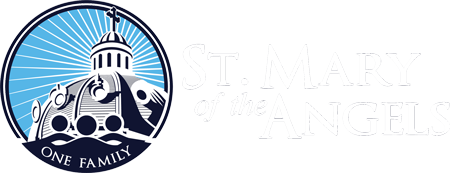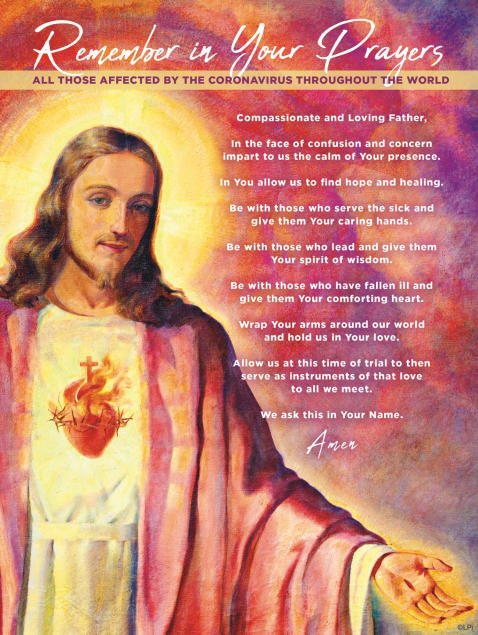COVID-19—the Corona virus—has struck, sending countries around the world scrambling to try to stop it. Many people are reacting with fear and responding by isolating themselves from others or by quarantining those infected, often in cruel ways, like lepers of old, outcast from the general population without compassion, charity, or dignity. We have seen people imprisoned in cruise liners and whole cities put into lockdown. Those who try to live charity and compassion toward those infected are shunned and ridiculed for the risk of further spreading the virus and for risking their own demise and death.
It seems like the fear of death is consuming the world, giving the devil control over us and over the world:
“Since therefore the children share in flesh and blood, he himself likewise partook of the same nature, that through death he might destroy him who has the power of death, that is, the devil, and deliver all those who through fear of death were subject to lifelong bondage” (Hebrews 2:14-15).
Christians are called to be men and women of faith by taking up our cross daily to follow our Lord. How often God addresses the People of God, “Fear not;” how often Jesus Christ addressed his followers, “Do not be afraid;” St. John Paul II began his pontificate addressing the modern Christian world, “Do not be afraid!” Yet fear is driving the world into a frenzy.
As Christians we do not fear pain; we do not fear death. As St. Josemaría wrote:
“For others, death is a stumbling block, a source of terror. For us, death—Life—is an encouragement and a stimulus. For them it is the end; for us, the beginning.
“Don’t be afraid of death. Accept it from this day on, generously… when God wills it, how God wills it, where God wills it. Believe me, it will come at the time, in the place and in the way that are best — sent by your Father God. May our sister death be welcome!” (The Way, 738-739)
So let us have faith and then be responsible citizens, living good hygiene as recommended by the doctors, and healthy social practices during the flu season. This includes:
- Staying home when you are sick; stay home for at least 24 hours after your fever is gone: we are not obliged to attend Mass, and out of charity they ought not to attend.
- Avoid using Holy Water fonts; use a Holy Water bottle instead.
- Avoid physical contact during the optional Sign of Peace.
- Refrain from the faithful receiving Holy Communion via the chalice (except for those with celiac disease or sensitivity)
- Avoid direct contact with saliva in the distribution of Holy Communion (while our Archdiocese encourages each to receive Holy Communion reverently in open hands, another Archdiocese consulted doctors—I have too—who see receiving Holy Communion in the hand of equal or greater risk than receiving on the tongue properly, due to the amount of germs on the hands from touching railings, pews, and other objects)—we’ll let you make the responsible decision on this.
When Jesus was asked about when the kingdom of God was coming, he told them: “that they ought always to pray and not lose heart… Nevertheless, when the Son of man comes, will he find faith on earth?” (Luke 18:1,8). So, let us put our complete faith in Jesus Christ, our Lord and Savior!
-Fr. John Waiss
Pandemia de Miedo vs. Fe
El COVID-19—Corona virus—se ha propagado mucho, haciendo que los países de todo el mundo luchen para tratar de detenerlo. Muchas personas están reaccionando con miedo y han respondido aislándose ellas mismas, o bien han sido aisladas por otras personas; también se ha respondido poniendo en cuarentena a quienes están infectados, con frecuencia de una manera cruel, como se hacía a los leprosos en el pasado, aislados de la población en general, sin compasión, caridad, ni dignidad. Hemos visto gente encarcelada en cruceros y ciudades enteras encerradas. Aquellos que tratan de vivir la caridad y la compasión hacia los infectados son rechazados y ridiculizados, por el riesgo de que vayan a propagar el virus, y por exponerse a su propia ruina y muerte.
Parece que el miedo a la muerte está consumiendo el mundo, dándole al diablo el control sobre nosotros y sobre el mundo:
“Y ya que los hijos tienen una misma sangre y una misma carne, él también debía participar de esa condición, para reducir a la impotencia, mediante su muerte, a aquel que tenía el dominio de la muerte, es decir, al demonio, y liberar de este modo a todos los que vivían completamente esclavizados por el temor de la muerte.” (Hebreos 2:14-15).
Los cristianos estamos llamados a ser hombres y mujeres de fe, tomando diariamente nuestra cruz para seguir a nuestro Señor. Con qué frecuencia Dios se dirige a su Pueblo diciéndole, “No temas;” con qué frecuencia Jesucristo se dirigió a sus seguidores: “No tengan miedo;” San Juan Pablo II comenzó su pontificado diciéndole al mundo cristiano moderno: “¡No tengan miedo!” Sin embargo, el miedo está llevando al mundo hacia un frenesí.
Como cristianos no tememos al dolor; no tememos a la muerte. Como escribió San Josemaría:
“A los “otros”, la muerte les para y sobrecoge. —A nosotros, la muerte —la Vida— nos anima y nos impulsa. Para ellos es el fin: para nosotros, el principio.
No tengas miedo a la muerte. —Acéptala, desde ahora, generosamente…, cuando Dios quiera…, como Dios quiera…, donde Dios quiera. —No lo dudes: vendrá en el tiempo, en el lugar y del modo que más convenga…, enviada por tu Padre-Dios. — ¡Bienvenida sea nuestra hermana la muerte!” (Camino, 738-739)
Así que tengamos fe, y luego seamos ciudadanos responsables, viviendo una buena higiene, y prácticas sociales saludables de acuerdo a lo que recomiendan los médicos durante la temporada de gripe, Esto incluye:
- Permanecer en casa cuando usted está enfermo; quedarse en casa por lo menos 24 horas después de que la fiebre se ha ido: no estamos obligados a asistir a Misa, y por caridad no se debe asistir.
- Evite el uso de fuentes de agua bendita. En lugar de eso, llévese una botellita con agua bendita. Evite el contacto físico durante la Señal de la Paz (que es opcional).
- Abstenerse de que los fieles reciban la Santa Comunión a través del cáliz (excepto para aquellos con celiaquía o sensibilidad)
- Evitar el contacto directo con saliva en la distribución de la Sagrada Comunión. (Mientras que nuestra Arquidiócesis alienta a cada persona a recibirla reverentemente en la mano, otra Arquidiócesis consultó a médicos —y yo también— quienes advierten de un peligro igual o mayor al recibir la Comunión en la mano, tomando en cuenta que hay más gérmenes en la mano por tocar las barandillas, las bancas y otros objetos)— dejamos que usted responsablemente tome la decisión al respecto.
Cuando le preguntaron a Jesús que cuándo iba a venir el reino de Dios les dijo: “que era necesario orar siempre sin desanimarse… Pero cuando venga el Hijo del hombre, ¿encontrará fe sobre la tierra?” (Lucas 18:1,8). Por lo tanto, pongamos toda nuestra fe en Jesucristo, ¡nuestro Señor y Salvador!
-Padre John Waiss
Pandemia strachu a wiara
COVID-19 – w potocznym obiegu znany jako koronawirus – rozsiał panikę w państwach całego globu, próbujących zatrzymać jego szybkie rozprzestrzenianie. Wiele osób reaguje strachem na informacje o wirusie i stara się izolować od reszty społeczeństwa, lub też wysyła podejrzanych o zakażenie na kwarantannę, często w sposób niehumanitarny, traktując ich niczym trędowatych w dawnych czasach, wyrzutków społeczeństwa, pozbawionych godności. Słyszeliśmy o ludziach uwięzionych na statkach rejsowych, czy całych miastach zamkniętych. Ci, którzy starają się zwrócić do zakażonych z miłością i współczuciem, są atakowani i oskarżani o dalsze rozprzestrzenianie wirusa i zagrażanie życiu innych i swojemu.
Wygląda na to, że strach przed śmiercią pożera społeczeństwo, pozwalając diabłowi przejąć kontrolę nad nami i całym światem:
Ponieważ zaś dzieci uczestniczą we krwi i ciele, dlatego i On także bez żadnej różnicy stał się ich uczestnikiem, aby przez śmierć pokonać tego, który dzierżył władzę nad śmiercią, to jest diabła, i aby uwolnić tych wszystkich, którzy całe życie przez bojaźń śmierci podlegli byli niewoli (Hbr 2:14-15).
Chrześcijanie wezwani są do tego, by żyć w wierze, dźwigać swój krzyż i podążać za naszym Panem. Jakże często Bóg zwraca się do swojego ludu, „nie bój się”, jakże często Jezus Chrystus mówi do swoich uczniów: „nie lękajcie się”. Św. Jan Paweł II tymi słowami rozpoczął swój pontyfikat, zwracając się do współczesnego świata chrześcijańskiego: „Nie lękajcie się!” Obecnie jednak strach popycha ludzi na granice paniki.
Jako chrześcijanie, nie powinniśmy bać się bólu, ani śmierci. Św. Josemaría pisze:
[Innych] śmierć paraliżuje i przeraża. Nas śmierć — Życie — zachęca i przynagla. Dla nich to koniec, dla nas — początek.
Nie lękaj się śmierci. — Przyjmij ją już teraz wielkodusznie… kiedy Bóg zechce… jak Bóg zechce… gdzie Bóg zechce. — Nie miej wątpliwości: przyjdzie w czasie, w miejscu i w sposób najbardziej odpowiedni… zesłana przez twojego Ojca, Boga. — Niech będzie błogosławiona nasza siostra, śmierć! (Droga 738-739)
Nie traćmy więc wiary, ale jednocześnie zachowujmy się jak odpowiedzialni obywatele, przestrzegając zasady higieny osobistej zalecane przez lekarzy, jak również odpowiednie zachowania społeczne, czyli:
- Zostańmy w domu jeśli jesteśmy chorzy; nie powinniśmy wychodzić z domu przez 24 godziny po ustąpieniu gorączki. Chorzy nie mają obowiązku uczestnictwa we Mszy świętej, a z troski o bliźnich nie powinni przychodzić do kościoła na nabożeństwa.
- Nie używajmy wody święconej z kropielnic
- Przekazujmy sobie znak pokoju w taki sposób, by nie dotykać innych
- Nie przyjmujmy Komunii świętej pod postacią wina (wyjątek stanowią chorzy na celiakię czy z alergiami pokarmowymi).
- Unikajmy kontaktu ze śliną przy udzielaniu komunii świętej (Archidiecezja zaleca, aby przyjmować komunię na rękę, lecz niektórzy lekarze, z którymi konsultowałem się również i ja, uważają, że przyjmowanie na rękę stanowi takie samo, a może nawet i większe zagrożenie, ponieważ na rękach znajduje się najwięcej zarazków poprzez dotykanie ławek, poręczy i innych przedmiotów w kościele. Decyzję o tym, jak przyjmować Komunię pozostawiamy naszym wiernym).
Na pytanie kiedy ma przyjść królestwo Boże Jezus opowiedział uczniom, „że zawsze powinni modlić się i nie ustawać. […] Czy jednak Syn Człowieczy znajdzie wiarę na ziemi, gdy przyjdzie?” (Łk 18:1,8). Zaufajmy więc w pełni Jezusowi Chrystusowi, naszemu Panu i Zbawicielowi!
-Ks. John Waiss



